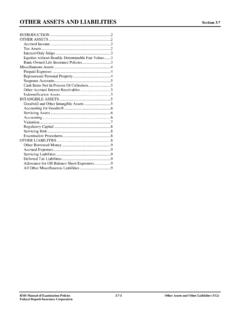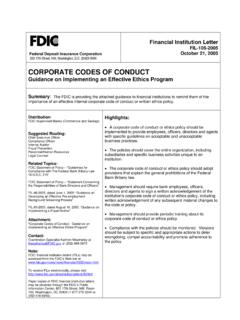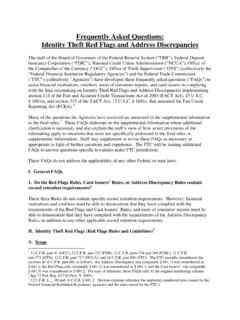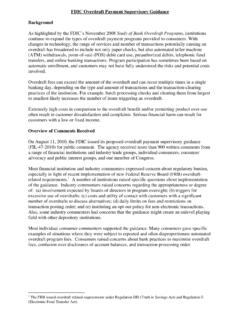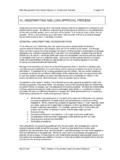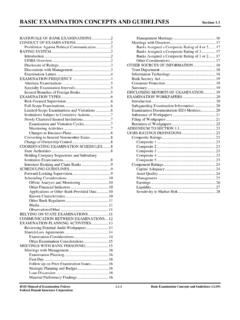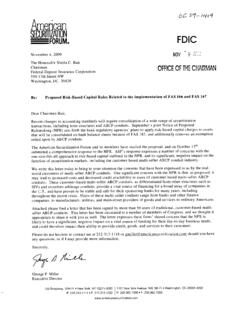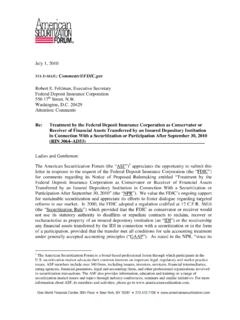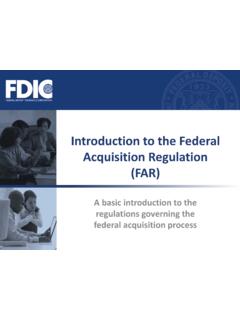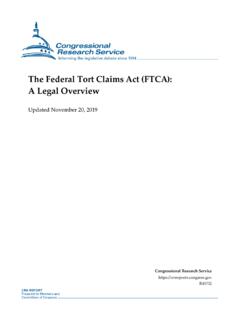Transcription of MANAGEMENT Section 4 - Federal Deposit Insurance …
1 MANAGEMENT Section introduction The quality of MANAGEMENT is probably the single most important element in the successful operation of a bank. For purposes of this Section , MANAGEMENT includes both the board of directors, which is elected by the shareholders, and executive officers, who are appointed to their positions by the board. In the complex, competitive, and rapidly changing environment of financial institutions, it is extremely important for all members of bank MANAGEMENT to be aware of their responsibilities and to discharge those responsibilities in a manner which will ensure stability and soundness of the institution, so that it may continue to provide to the community the financial services for which it was created.
2 The extreme importance of a bank director's position is clearly emphasized by the fact that bank directors can, in certain instances, be held personally liable. Also, Congress has placed great emphasis on the role of bank MANAGEMENT by passing legislation which allows regulatory authorities to utilize "cease and desist" actions against individuals (instead of solely against the institution) to assess civil money penalties (CMPs), and even remove an officer, director, or other person participating in the affairs of the bank when their gross negligence or disregard for safety and soundness considerations threatens the financial safety of the bank.
3 The board of directors is the source of all authority and responsibility. In the broadest sense, the board is responsible for formulation of sound policies and objectives of the bank, effective supervision of its affairs, and promotion of its welfare. On the other hand, the primary responsibility of executive MANAGEMENT is implementation of the board's policies and objectives in the bank's day-to-day operations. While selection of competent executive MANAGEMENT is critical to the successful operation of any bank, the continuing health, viability, and vigor of the bank are dependent upon an interested, informed and vigilant board of directors.
4 Therefore, the main thrust of this Section is devoted to the powers, responsibilities, and duties vested in bank directors. MANAGEMENT /DIRECTORS Selection and Qualifications of Directors Being selected to serve as a bank director is generally regarded as an honor, for it often denotes an individual's reputation as being successful in business or professional endeavors, public spirited, and entitled to public trust and confidence. It is this latter attribute and the public accountability implicit therein that distinguishes the office of bank director from directorships in most other corporate enterprises.
5 Bank directors are not only responsible to the stockholders who elected them, but must also be concerned with the safety of depositors' funds and the influence the bank exercises on the community it serves. Various laws governing the election of board members emphasize the importance of a director s position. Statutory or regulatory qualifications usually include taking an oath of office, unencumbered ownership of a specific amount of the bank's capital stock, and residential and citizenship requirements. Other laws also pertain to the qualification and selection of directors.
6 There are, for example, certain restrictions, prohibitions, and penalties relating to: interlocking directorates; purchases of assets from or sales of assets to directors; commissions and gifts for procuring loans; and criminal activities such as embezzlement, abstraction, willful misapplication, making false entries, and improper political contributions. These qualifications and restrictions have no counterpart in general corporate law and both illustrate and emphasize the quasi-public nature of banking, the unique role of the bank director, and the grave responsibilities of that office.
7 The position of bank director is one, therefore, not to be offered or entered into lightly. Aside from the legal qualifications, each director should bring to the position particular skills and experience which will contribute to the composite judgment of the group. Directors should have ideas of their own and the courage to express them, sufficient time available to fulfill their responsibilities, and be free of financial difficulties which might tend to embarrass the bank. The one fundamental and essential attribute, which all bank directors must possess without exception, is personal integrity.
8 Its presence usually gives assurance of a well-intentioned, interested and responsible director capable of assuming the important fiduciary responsibilities of the office and representing fairly and equitably the diverse interests of stockholders, depositors and the general public. The Statement Concerning the Responsibilities of Bank Directors and Officers states that the duties of loyalty (to administer the affairs of the bank with candor, personal honesty and integrity) and care (to act as prudent and diligent business persons in conducting the affairs of the bank) are among the most important responsibilities of bank directors.
9 Other desirable personal characteristics include: knowledge of the duties and responsibilities of the office; genuine interest in performing those duties and responsibilities to the best of their ability; capability to recognize and avoid potential conflicts of interest, or the appearance of same, which might impair their objectivity; sound business judgment and experience to facilitate understanding of banking and banking problems; familiarity with the community and trade area the bank RMS Manual of Examination Policies MANAGEMENT (4-18 ) Federal Deposit Insurance corporation MANAGEMENT Section serves and general economic conditions; and an independence in their approach to problem solving and decision making.
10 Powers, Duties and Responsibilities of Directors The powers, duties and responsibilities of the board of directors are usually set forth in the applicable banking statutes and the bank's charter and bylaws. Generally speaking, the powers and responsibilities of bank directors include but are not limited to those discussed below. Regulating the Manner in Which All Business of the Bank is Conducted Directors must provide a clear framework of objectives and policies within which executive officers operate and administer the bank's affairs.
